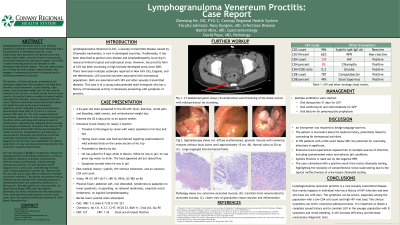Tuesday Poster Session
Category: Colon
P3135 - Lymphogranuloma Venereum Proctitis
Tuesday, October 24, 2023
10:30 AM - 4:00 PM PT
Location: Exhibit Hall

Has Audio

Zhexiang He, DO
Conway Regional Health System
Conway, AR
Presenting Author(s)
Zhexiang He, DO
Conway Regional Health System, Conway, AR
Introduction: Lymphogranuloma Venereum (LGV) caused by Chlamydia trachomatis was rare in developed countries. Traditionally, it has always been related to genital ulcer disease and lymphadenopathy, which occur in resource-limited tropical and subtropical areas. It is associated with HIV and other sexually transmitted diseases. The proctitis type of Lymphogranuloma Venereum has been found in high-latitude developed areas since 2003. LGV proctitis occurs in the homosexual population and is associated with HIV and STDs. This case is of a young undocumented male immigrant who has a history of homosexual activity in Venezuela presenting with symptoms of proctitis.
Case Description/Methods: A 24-year-old male presented to the emergency department with fever, diarrhea, rectal pain, rectal bleeding, night sweats, and unintentional weight loss. The patient entered the US 6 days prior as an asylum seeker. He had traveled extensively for nearly 2 months. Past medical history included syphilis, HIV without treatment, and an unknown CD4 cell count. The physical exam shows perirectal erythema and exquisite pain with the rectal exam. ESR 127 and CRP 1.76. Stool occult blood positive. Abdominal CT shows marked circumferential wall thickening of the distal rectum with mild perirectal fat stranding. Sigmoidoscopy showed severe mucosal ulceration with significant internal hemorrhoids. Pathology confirms extensive ulceration and associated granulation-type tissue change with focal viable mucosa showing active proctitis. Immunology shows a CD4 count of 129. The Gastrointestinal panel (GPP) was positive for Giardia, Campylobacter, and Sapovirus. The rectal Chlamydia and Gonorrhea swab was positive for Chlamydia trachomatis. The diagnosis of LGV proctitis was made. The LGV was treated with oral doxycycline for 21 days.
Discussion: This was a complicated case. We needed an interpreter to communicate, and the patient was inconsistent with his history, perhaps wanting to hide or avoid discussing his homosexual activities. In this case, he had a history of untreated HIV infection, and multiple exposures during his travels, including contaminated river water and poor conditions in the Mexican jail. Proctitis can be caused by syphilis; however, his RPR was negative. He had a diarrheal illness, which was treated. Ultimately, the rectal chlamydia testing returned positive. In these cases, it is important to obtain rectal swab testing, as urine chlamydia testing is typically negative.

Disclosures:
Zhexiang He, DO. P3135 - Lymphogranuloma Venereum Proctitis, ACG 2023 Annual Scientific Meeting Abstracts. Vancouver, BC, Canada: American College of Gastroenterology.
Conway Regional Health System, Conway, AR
Introduction: Lymphogranuloma Venereum (LGV) caused by Chlamydia trachomatis was rare in developed countries. Traditionally, it has always been related to genital ulcer disease and lymphadenopathy, which occur in resource-limited tropical and subtropical areas. It is associated with HIV and other sexually transmitted diseases. The proctitis type of Lymphogranuloma Venereum has been found in high-latitude developed areas since 2003. LGV proctitis occurs in the homosexual population and is associated with HIV and STDs. This case is of a young undocumented male immigrant who has a history of homosexual activity in Venezuela presenting with symptoms of proctitis.
Case Description/Methods: A 24-year-old male presented to the emergency department with fever, diarrhea, rectal pain, rectal bleeding, night sweats, and unintentional weight loss. The patient entered the US 6 days prior as an asylum seeker. He had traveled extensively for nearly 2 months. Past medical history included syphilis, HIV without treatment, and an unknown CD4 cell count. The physical exam shows perirectal erythema and exquisite pain with the rectal exam. ESR 127 and CRP 1.76. Stool occult blood positive. Abdominal CT shows marked circumferential wall thickening of the distal rectum with mild perirectal fat stranding. Sigmoidoscopy showed severe mucosal ulceration with significant internal hemorrhoids. Pathology confirms extensive ulceration and associated granulation-type tissue change with focal viable mucosa showing active proctitis. Immunology shows a CD4 count of 129. The Gastrointestinal panel (GPP) was positive for Giardia, Campylobacter, and Sapovirus. The rectal Chlamydia and Gonorrhea swab was positive for Chlamydia trachomatis. The diagnosis of LGV proctitis was made. The LGV was treated with oral doxycycline for 21 days.
Discussion: This was a complicated case. We needed an interpreter to communicate, and the patient was inconsistent with his history, perhaps wanting to hide or avoid discussing his homosexual activities. In this case, he had a history of untreated HIV infection, and multiple exposures during his travels, including contaminated river water and poor conditions in the Mexican jail. Proctitis can be caused by syphilis; however, his RPR was negative. He had a diarrheal illness, which was treated. Ultimately, the rectal chlamydia testing returned positive. In these cases, it is important to obtain rectal swab testing, as urine chlamydia testing is typically negative.

Figure: Sigmoidoscopy shows diffuse erythematous, granular mucosa with numerous erosions without focal ulcers until approximately 15 cm.
Disclosures:
Zhexiang He indicated no relevant financial relationships.
Zhexiang He, DO. P3135 - Lymphogranuloma Venereum Proctitis, ACG 2023 Annual Scientific Meeting Abstracts. Vancouver, BC, Canada: American College of Gastroenterology.
